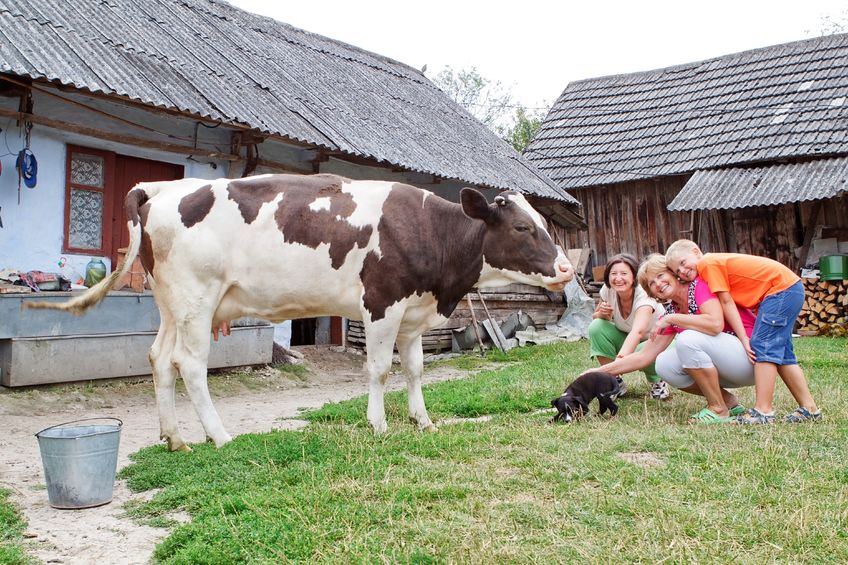
The Princes Countryside Fund has released a research report on the future of the family farm in the UK, exploring the change that has been experienced in recent years.
The report considers a small farm to be a farm that needs the labour input of up to two people, or to use technical language, a standard labour requirement of two full time labour equivalents.
The small family farm has had a distinctive issues thrust upon them, including contributing to the rural economy, employment and environment management, but also their social and cultural significance.
It concludes by identifying the factors that will help improve the resilience of the small family farm and provides a list of recommendations for key stakeholders.
Prepared by Exeter University for the Prince’s Countryside Fund, the report recommends greater security on Farm Business Tenancies (FBTs) and better access to land for new entrants.
Recommendations for farmers and businesses to become more resilient
1) Adopt lifelong learning through regularly accessing advice, support and information
to help inform business decisions.
2) Develop good management and technical skills to assist with the effective day-to-day
management of a successful farm business.
3) Develop and implement a plan for succession and/or retirement from farming.
4) Collaborate with other farmers and supply chain partners, including developing local networks, peer support relationships and business opportunities.
5) If appropriate and after full market research and business advice, introduce new
enterprises to diversify farm business income.
Recommendations for the sector to support small family farms
6) The formation of a task force to carry out further examination of variable performance in agriculture with the aim of providing further evidence on the causes of variable farm business performance and the factors that help improve performance.
7) Develop a concordat between the various professional bodies who give advice to famers with a view to developing a common protocol for cross-referral and communication strategy about the range of advice and support available.
8) The Farming Help Charities in conjunction with The Prince’s Countryside Fund and other helping agencies should identify and equip individuals within farming areas to act as ‘catalysts’, guiding farmers to the information and support they need and assisting them in this process.
9) Catalysts should be encouraged to establish a ‘good farming neighbours’ system to allow farmer to farmer peer group support, learning from other mentoring schemes.
10) Rural estates should encourage the creation of opportunities for new farm businesses by investing in the provision of new housing for existing tenants to facilitate new entrants.
11) Rural estates should be encouraged to take a lead in assisting new entrants through either Farm Business Tenancies or share farming arrangements.
12) Rural estates should be encouraged to raise the minimum term for Farm Business Tenancies to 10 years to help strengthen farm businesses and encourage longer-term planning and investment with a view to policy change
Recommendations for policy makers
13) Utilise a more flexible approach to encourage new entrants into farming through share farming arrangements and Farm Business Tenancies.
14) Consideration should be given in planning policies to allow farmers of retirement age to build a retirement house when they agree to facilitate new entrants through Farm Business Tenancies, share farming or land purchase.
15) Greater investment through rural development funding into farming entrance schemes such as Fresh Start Academies and the Fresh Start Land Enterprise matching service.
16) Discussions should be held to establish what opportunities can be addressed through adjustments to tax reliefs currently available with the specific need to attract new entrants into farming.
17) Promoters of Short Supply Chains and added value (such as social enterprises, local authorities and rural development schemes) should make engagement with small family farmers a strategic priority.
'Must read for all policymakers in the environment'
The Tenant Farmers Association has welcomed the report, describing the Princes Countryside Fund as a 'tremendous force for good'.
Chief Executive George Dunn said: "The research on family farms published today is a must read for all policymakers in this environment.
Particularly in light of the recent referendum vote which will lead to Britain leaving the European Union.
"In developing new agricultural and rural policies this report provides a ready-made platform," said Mr Dunn.
"In particular, the Tenant Farmers Association is pleased that the research report has picked up the theme of our FBT10+ campaign aimed at encouraging longer term FBTs.
"To create a resilient family farming sector we need tenant farmers to have long-term security.
"The TFA has been arguing for tenancies of 10 years or more and this has been endorsed by the research team from Exeter University.
"Farm Business Tenancies have been too short for too long and change is much overdue particularly given these tenancies have been in existence for over 20 years.
"I hope that the Government will take on board these clear recommendations from such a well-placed and independent source," said Mr Dunn.
